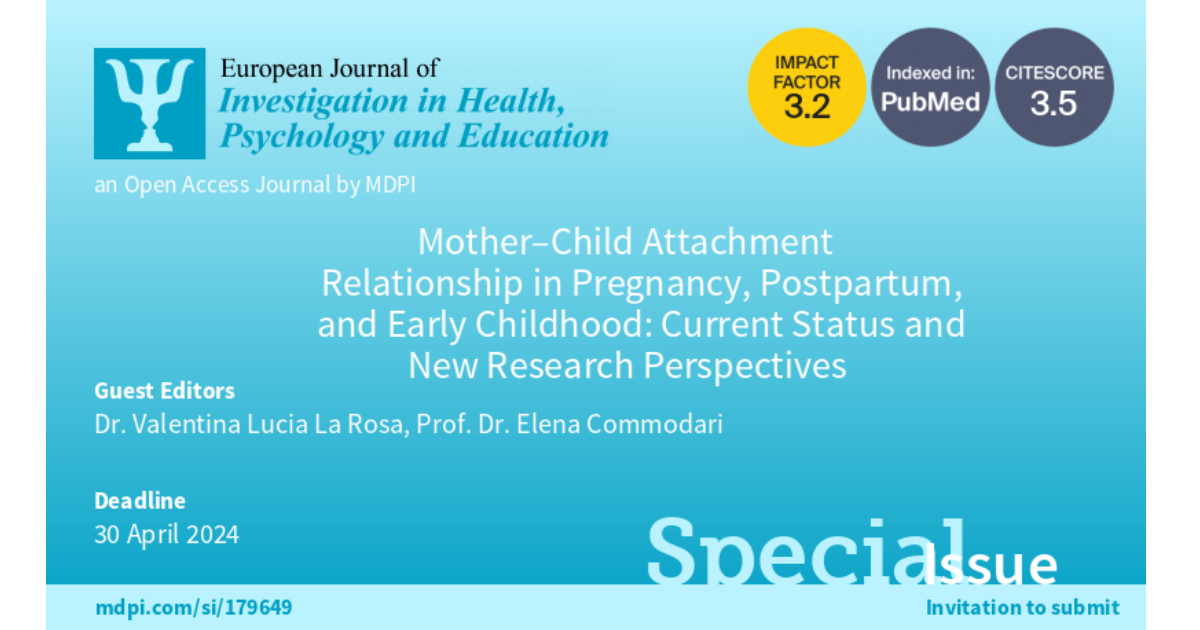Mother–Child Attachment Relationship in Pregnancy, Postpartum, and Early Childhood: Current Status and New Research Perspectives
A special issue of European Journal of Investigation in Health, Psychology and Education (ISSN 2254-9625).
Deadline for manuscript submissions: 30 April 2024 | Viewed by 966

Special Issue Editors
Interests: developmental psychology; educational psychology; life cycle psychology; development in adolescence; attachment relationships; family; learning and quality of educational settings
Special Issues, Collections and Topics in MDPI journals
Interests: emotion recognition; attention; pregnancy; attachment; learning disorders; mental imagery; COVID-19 consequences
Special Issues, Collections and Topics in MDPI journals
Special Issue Information
Dear Colleague,
The perinatal period is a critical and sensitive period of development for both mothers and their infants, and the quality of the attachment between mother and child, which is established during the period of pregnancy, significantly impacts cognitive, emotional, and social development in early childhood. This Special Issue will bring together leading researchers and practitioners in developmental and perinatal psychology to present the latest contributions and interventions related to mother–child attachments in pregnancy, postpartum, and early childhood. The Special Issue will cover a range of topics, including:
- Theoretical perspectives on mother–child attachment during the perinatal period and early childhood;
- Research on the factors that influence the development of mother–child attachment, including maternal psychological well-being, infant temperament, and environmental factors;
- Assessment tools and techniques for measuring mother–child attachment;
- Interventions to promote healthy mother–child attachment and prevent or treat postpartum disorders;
- Cultural and contextual and cultural factors that influence mother–child attachment;
- Implications of recent research on mother–child attachment for policy and practice, including the development of screening tools, guidelines for perinatal mental health care, and strategies for promoting positive attachment relationships.
Dr. Valentina Lucia La Rosa
Prof. Dr. Elena Commodari
Guest Editors
Manuscript Submission Information
Manuscripts should be submitted online at www.mdpi.com by registering and logging in to this website. Once you are registered, click here to go to the submission form. Manuscripts can be submitted until the deadline. All submissions that pass pre-check are peer-reviewed. Accepted papers will be published continuously in the journal (as soon as accepted) and will be listed together on the special issue website. Research articles, review articles as well as short communications are invited. For planned papers, a title and short abstract (about 100 words) can be sent to the Editorial Office for announcement on this website.
Submitted manuscripts should not have been published previously, nor be under consideration for publication elsewhere (except conference proceedings papers). All manuscripts are thoroughly refereed through a single-blind peer-review process. A guide for authors and other relevant information for submission of manuscripts is available on the Instructions for Authors page. European Journal of Investigation in Health, Psychology and Education is an international peer-reviewed open access monthly journal published by MDPI.
Please visit the Instructions for Authors page before submitting a manuscript. The Article Processing Charge (APC) for publication in this open access journal is 1400 CHF (Swiss Francs). Submitted papers should be well formatted and use good English. Authors may use MDPI's English editing service prior to publication or during author revisions.
Keywords
- developmental psychology
- perinatal psychology
- pregnancy
- postpartum
- early childhood
- attachment
Planned Papers
The below list represents only planned manuscripts. Some of these manuscripts have not been received by the Editorial Office yet. Papers submitted to MDPI journals are subject to peer-review.
Title: Early Parenting Interactions and First-Time Mothers’ Postnatal Depression and Parental Competence
Authors: Rachel W.E. Leong; Davinder Gill; Joanna Barlas; Patrick K.F. Lin
Affiliation: James Cook University Singapore
Abstract: Objectives: Schema Therapy helps us to understand the impact of early interactions with caregivers on adult mental health. These early interactions can be assessed through Schema Therapy-informed tools; however, these tools have yet to be used with a postnatal population, which represents a period of vulnerability for new mothers. Therefore, the present study aimed to evaluate the impact of positive and negative early parenting interactions on a first-time mother’s mental health and her sense of competence during the postnatal period, using recently revised and newly developed Schema Therapy-informed tools.
Design: This is a cross-sectional study.
Method: First-time mothers (N = 220) participated in an online survey within 12 months post-birth. Participants completed the Positive Parenting Schema Inventory (PPSI), Young Parenting Inventory – Revised (YPI-R2), Edinburgh Postnatal Depression Scale (EPDS), and Parenting Sense of Competence (PSOC) scale. Data were analysed using hierarchical multiple regression and mediational analysis.
Results: Negative early interactions with mothers and fathers led to greater postnatal depressive symptomology, whilst positive early interactions with mothers led to fewer postnatal depressive symptoms. Mediation analyses revealed that postnatal depressive symptoms mediated early parenting interactions and participants’ sense of parenting competence as a new mother.
Conclusions: The protective effects of positive early interactions with caregivers can help first-time mothers’ postnatal emotional adjustment and her sense of competence through diminished postnatal depressive symptoms. However, the enduring effects of negative early interactions with caregivers can contribute to a first-time mother’s risk of developing postnatal depression and negatively affect her sense of parental competence.







